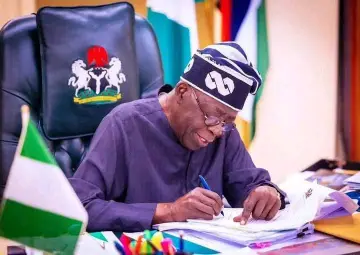President Bola Ahmed Tinubu has reaffirmed his administration’s commitment to tackling poverty through the Renewed Hope Ward Development Programme, a grassroots initiative aimed at empowering economic players across all 8,809 wards in Nigeria’s 774 local government areas. Speaking during the Federal Executive Council (FEC) meeting on August 13, 2025, the president expressed gratitude to council members for their dedication to his reform agenda.
“Distinguished members of the Federal Executive Council, let me begin by expressing my sincere appreciation for your unwavering commitment, resilience, and hard work in supporting this administration’s reform agenda,” he said.
President Tinubu highlighted that the government’s bold reforms have dismantled long-standing economic distortions, restored policy credibility, and enhanced economic resilience. According to him, these measures have also created a transparent and competitive business environment while boosting investor confidence.
He stated that the Nigerian economy is now better positioned to attract domestic and foreign investment, which is vital for sustained growth, job creation, and lifting millions out of poverty.
“Our Renewed Hope Agenda remains focused on achieving a $1 trillion economy by the year 2030,” he said, stressing the need to accelerate growth to a minimum of 7.0 percent by 2027. He described this target as both an economic goal and a moral obligation, citing the recent IMF Article IV Report as proof that investment-led growth is essential for poverty reduction.
On the Renewed Hope Ward Development Programme, the president explained that it is designed to use a micro-level approach for poverty alleviation, engaging state and local governments as well as private sector partners for impactful implementation.
“This programme is close to my heart. It is designed to empower active grassroots economic players,” he added.
The president also revealed that he had urged governors during a recent National Economic Council meeting to prioritise productivity-enhancing investments, strengthen food security, and deepen collaboration with local governments. He stressed that these steps are critical to ensuring no Nigerian is left behind in the country’s development drive.
On economic sustainability, President Tinubu pointed out the importance of savings as a catalyst for investment and growth. He expressed concern that public investment stands at only 5 percent of GDP, largely due to inadequate public savings.
He called for an urgent review of spending efficiency and deductions from the Federation Account, including costs of collection by agencies like FIRS, Customs, NUPRIC, and NIMASA.
Additionally, he suggested reassessing the 30 percent management fee and frontier exploration deductions by NNPC in line with the Petroleum Industry Act. “We must optimise every available Naira to sustain our momentum and finance our growth trajectory, especially in a time of global liquidity constraints,” he noted.
President Tinubu directed the Economic Management Team, chaired by the Minister of Finance and Coordinating Minister of the Economy, to review all deductions and revenue retention practices and present actionable recommendations to the council.
“The task ahead is great, but so is our resolve. Let us continue to work together with unity of purpose, guided by the Renewed Hope Agenda, to build a prosperous, inclusive, and resilient Nigeria,” he concluded.

